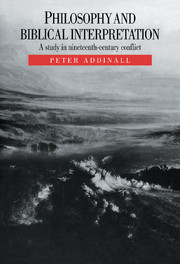Book contents
- Frontmatter
- Contents
- Preface
- Introduction
- 1 The general picture
- 2 David Hume
- 3 William Paley
- 4 Biblical conservatism
- 5 Conservative natural theology: Paley's design argument
- 6 Conservative natural theology: Thomas Chalmers
- 7 Liberal natural theology
- 8 The later nineteenth century
- 9 Immanuel Kant
- 10 Critical philosophy and the Bible
- Conclusion
- Notes
- Bibliography
- Index
6 - Conservative natural theology: Thomas Chalmers
Published online by Cambridge University Press: 23 December 2009
- Frontmatter
- Contents
- Preface
- Introduction
- 1 The general picture
- 2 David Hume
- 3 William Paley
- 4 Biblical conservatism
- 5 Conservative natural theology: Paley's design argument
- 6 Conservative natural theology: Thomas Chalmers
- 7 Liberal natural theology
- 8 The later nineteenth century
- 9 Immanuel Kant
- 10 Critical philosophy and the Bible
- Conclusion
- Notes
- Bibliography
- Index
Summary
Thomas Chalmers was the one theologian to contribute to the Bridgewater Treatises, with a work entitled The Adaptation of External Nature to the Moral and Intellectual Constitution of Man. To some extent he shared in the failings of the rest of the enterprise. He started out on the basis of the machine analogy and Paley's teleology, and he regarded it as self-evident that intelligence must spring from intelligence and that mind cannot spring from the workings of ‘unconscious matter’. Thus, from the very beginning there is built into the subject of Chalmers' treatise a profound division between the observing and reflecting human mind, and the natural environment.
What Chalmers claims to be self-evident is, of course, by no means so, and it certainly wasn't to Hume. Even if the point is granted, we are still left with the question how mind and personality are related to the material world, including our own bodies. This line of reasoning leaves us with the crude ‘Ghost in the Machine’ made famous by Gilbert Ryle, and all the problems of Cartesian dualism. It emphasises the distinctness of observer and observed nature, an emphasis of crucial significance only too easily assumed rather than explicitly recognised, and leaves us with the question how an object of one kind is, or can be adapted to an object of a quite different kind. It may be that no answer to the question is possible, but in that case some explanation is required concerning the subject-matter of Chalmers' treatise as it appears in the title.
- Type
- Chapter
- Information
- Philosophy and Biblical InterpretationA Study in Nineteenth-Century Conflict, pp. 107 - 137Publisher: Cambridge University PressPrint publication year: 1991



